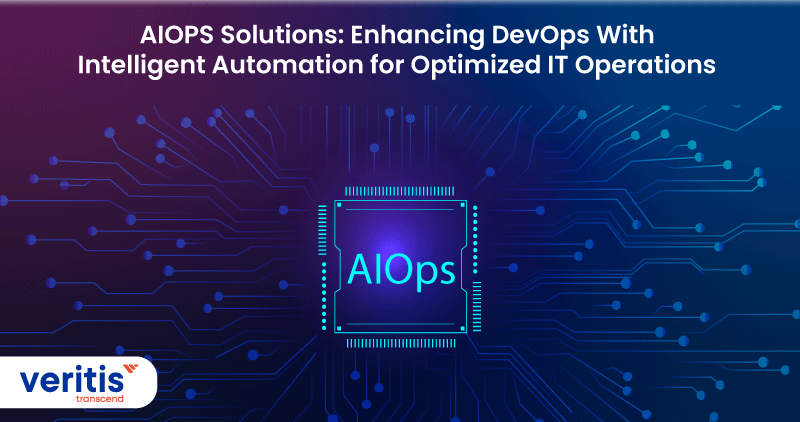
AIOps is gaining significance in modern DevOps practices. It merges AI/ML services and automation technologies to enhance operational efficiency and productivity in the era of digital transformation. According to Gartner, by 2023, around 30% of large enterprises will adopt AIOps solutions for monitoring their applications and infrastructure.
AIOps is when we use machine learning and deep learning to create models that help solve problems in IT operations. These models are built using neural networks and analytical techniques. They are then applied to address various issues that arise in IT operations.
AIOps uses tools that gather and organize a lot of data connected to an application or system. Advanced analytical models then use this data to generate valuable insights for development, operations, and business teams.
We will explore how AIOps solutions play a key role in automating IT operations, detecting anomalies, and providing real-time insights for DevOps. We will also outline a roadmap for integrating AIOps into DevOps to achieve advanced automation and benefits.
What is AIOps?
AIOps is a term used to describe big data analytics, machine learning, and AI operations technologies. These technologies are used to automate the detection and resolution of common IT problems. Large enterprises generate massive log and performance data from their systems, services, and applications.
This data can make it challenging for IT teams to identify and fix issues. Especially with distributed architectures like containers, microservices, and multi-cloud environments. AI operations help by using this data to monitor assets. And understand the relationships between components within and outside IT systems.
An AIOps platform should offer enterprises the following functionalities:
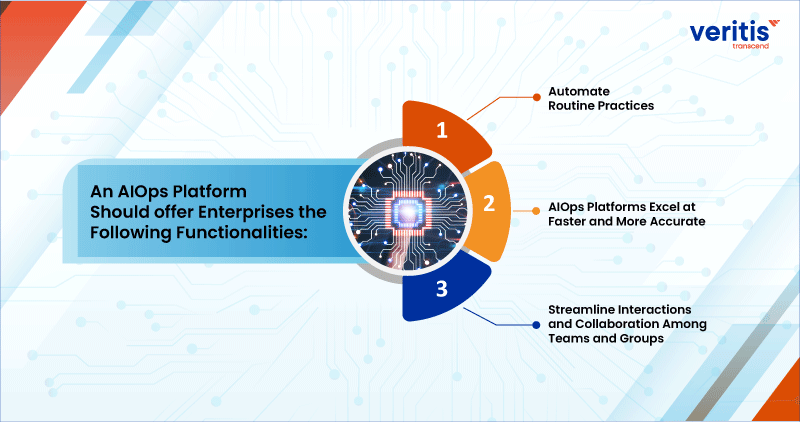
1) Automate Routine Practices
AIOps platforms can automate tasks like managing user requests and handling noncritical IT system alerts. For instance, they can assist a help desk system in automatically fulfilling user requests for resources. These platforms can also analyze alerts and decide if action is needed based on normal conditions and available data.
2) AIOps Platforms Excel at Faster and More Accurate
IT professionals may focus on dealing with a known malware event on a less important system while overlooking an unusual download or process starting on a crucial server because they are not actively monitoring for such threats. AI for IT operations handles this situation differently by prioritizing the event on the critical system, considering it a potential attack or infection due to its abnormal behavior. Meanwhile, it downgrades the importance of the known malware event by running an antimalware function.
3) Streamline Interactions and Collaboration Among Teams and Groups
AIOps ensures that each IT group receives relevant data and insights. Without AI operations like monitoring, automation, and service desk, teams have to share manually and process information through meetings or send data back and forth. AI for IT operations learns to display the right analysis and to monitor data for each group or team from a large pool of resource metrics.
AIOps, or Artificial Intelligence for IT Operations, offers numerous use cases for organizations. It enables proactive monitoring, anomaly detection, and automated incident resolution, making operations more efficient. With its predictive analytics capabilities, AIOps use cases provide real-time insights, empowering businesses to optimize performance and streamline their IT processes.
What is DevOps?
DevOps is a way of working that combines software development and IT operations teams. It aims to break down the silos between these two teams and improve collaboration. DevOps uses automation to streamline the software development and deployment process. This makes it possible to release software more quickly and reliably.
The core principles of DevOps are collaboration, communication, and automation.
Here are some of the benefits of DevOps:
- Increased speed of software delivery
- Improved reliability of software
- Reduced costs
- Increased customer satisfaction
DevOps is a good option for improving your software development and deployment process.
Useful link: What is DevOps Services?
What is the Functioning Mechanism of AIOps?
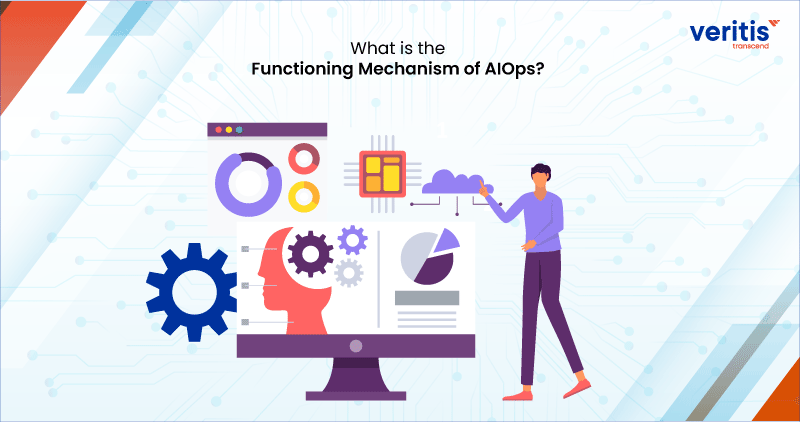
AIOps use sophisticated analytical technologies, like machine learning, to automate and optimize IT operations. A typical workflow of AIOps strategy involves the following steps:
1) Data Collection
AIOps platforms gather data from various sources, including application logs, events, configurations, incidents, performance metrics, and network traffic. This data can be structured (e.g., databases) or unstructured (e.g., social media posts and documents).
2) Data Analysis
The collected data is analyzed using machine learning algorithms like anomaly detection, pattern detection, and predictive analytics. This helps in identifying abnormalities that may need the IT staff’s attention. This step ensures that genuine issues are distinguished from false alarms or unnecessary noise.
3) Inference and Root Cause Analysis
AIOps performs root cause analysis to help identify the underlying causes of problems. This helps IT operations teams understand the origin of issues and take preventive measures to avoid similar problems in the future.
4) Collaboration
Once root cause analysis is finished, AIOps alerts the relevant teams and individuals. It shares necessary information and enables efficient collaboration, even across geographical distances. This collaboration helps preserve event data, which is essential for identifying similar issues in the future.
5) Automated Remediation
AIOps can automatically resolve issues, minimizing the need for manual intervention and accelerating incident response. It can perform automated actions like scaling resources, restarting services, or executing predefined scripts to address problems.
AIOps vendors are New Relic, Moogsoft, Datadog, Dynatrace, and more. These vendors offer comprehensive AIOps solutions that combine advanced analytics, machine learning, and automation to optimize IT operations and improve overall business performance.
Useful link: 6 Ways AIOps Optimizes Cloud Security
AIOPS Benefits and Drawbacks
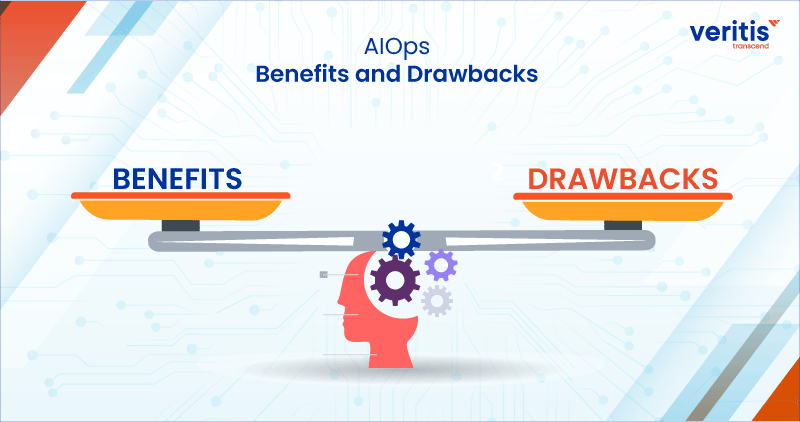
Benefits of AIOps
1)Time Savings
AIOps can save IT teams time by automating many of the tasks currently done manually. This includes tasks such as:
- Alerting: AIOps can automatically identify and alert IT teams to potential problems. This can free up IT staff from constantly monitoring systems and applications.
- Root cause analysis: AIOps strategy can use machine learning to detect the root cause of issues. This can save IT staff time from having to troubleshoot problems manually.
- Resolution: AIOps can recommend solutions to problems. This can help IT staff to resolve problems more quickly and efficiently.
2) Automated and Continuous Monitoring
AIOps can monitor IT systems 24/7, which can help to identify and resolve problems early on. This can prevent outages and other disruptions, which can save businesses money.
For example, AIOps solutions can monitor for changes in system performance, which can indicate a potential problem. AIOps can also monitor for patterns of behavior that may indicate a security breach.
3) Digital Transformation
AIOps can help businesses to adopt new technologies and processes, which can help them to improve their agility and efficiency. For example, the AIOps strategy can be used to automate the deployment of new applications. This can guide companies to quickly and easily adopt new technologies.
4) Enhanced Visibility
AIOps can provide IT teams with better visibility into their IT infrastructure, which can help them to identify and resolve problems more quickly. This includes visibility into:
- System performance: AIOps tools can track system performance metrics, such as CPU usage, memory usage, and network traffic. This can help IT teams to identify potential problems before they cause outages.
- Application performance: AIOps can track performance metrics like response times and error rates. It can help IT teams identify application problems before they impact users.
- Security: AIOps companies can track security metrics like login attempts and firewall logs. This can help IT teams to identify security breaches before they cause damage.
5) Expense Reduction
AIOps can help businesses to reduce costs by automating tasks, improving efficiency, and preventing outages. For example, AIOps companies can automate the provisioning of new servers. This can help businesses to save money on IT costs.
6) Data Correlation
AIOps can correlate data from multiple sources, guiding firms to identify and resolve problems quickly. For example, AIOps can correlate data from systems, applications, and security logs. This can help businesses to identify the root cause of problems more quickly.
7) Improved Collaboration
AIOps can improve collaboration between IT teams and other business units. This helps ensure that problems are resolved quickly and efficiently. For example, AIOps tools can create reports that can be shared with other business units. This can help other business units to understand the impact of problems and to take steps to mitigate those impacts.
Useful link: Choosing the Right AWS EC2 Instance Type for Your Application
Drawbacks of AIOps
1) Data Quality Issues
- AIOps relies on data to learn and make predictions. If the data is not up to date or accurate, AIOps cannot provide accurate insights or recommendations.
- This can be a problem for organizations that have large and complex IT infrastructures. Ensuring that all data is up-to-date and accurate can be challenging.
- Organizations can mitigate this risk by implementing data quality checks and cleansing tools.
2) Deployment and Integration Challenges
- Deploying and integrating an AIOps platform can be a complex and time-consuming process.
- This occurs because organizations need to integrate AIOps platforms with various IT systems.
- Organizations must clearly understand their IT infrastructure and data needs to implement AIOps tools successfully.
- They also need to have the resources to deploy and integrate the platform.
3) Overreliance on Automation
- While AIOps companies can automate numerous tasks, it remains crucial to incorporate human oversight to ensure the proper functioning of the automation.
- If organizations excessively rely on automation, problems can arise if the automation fails or is not properly configured.
- Organizations need to have a clear understanding of the risks associated with overreliance on automation and to put in place measures to mitigate those risks.
4) Bias and Ethical Concerns
- Training AIOps on partial data can introduce bias into its decision-making process.
- This can be a problem for organizations concerned about fairness and equity.
- Organizations need to be aware of this risk and take steps to mitigate it.
- They can do this by using data that is as representative as possible of the population they are serving.
- They can also use techniques to identify and remove bias from the data.
Useful link: Top 9 Digital Transformation Trends in 2023
Methods to Speed Up Business Growth With AIOps and DevOps
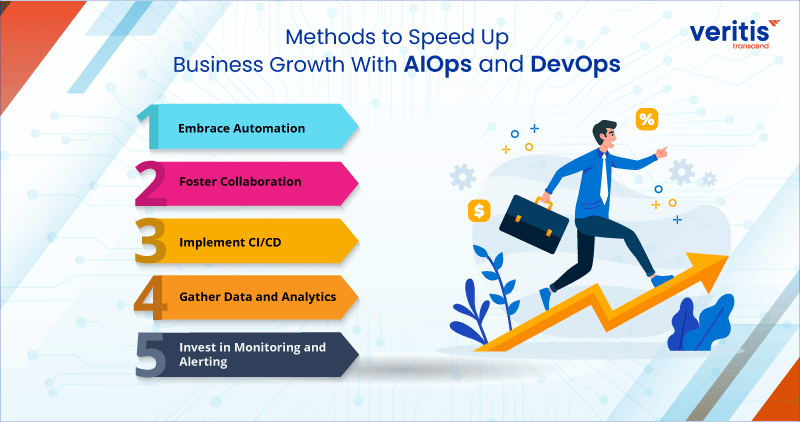
AIOps and DevOps are powerful methodologies that can help businesses accelerate their growth. These methodologies can help businesses to:
- Reduce manual effort by automating processes and tasks.
- Improve collaboration between development and operations teams.
- Release software more quickly using continuous integration and continuous delivery (CI/CD) practices.
- Gather data and analytics to gain insights into the performance of their IT systems.
- Invest in monitoring and alerting to identify and resolve performance issues quickly.
By following these strategies, businesses can improve operational efficiency, reduce costs, and deliver better customer experiences. Let’s have a look at these strategies.
1) Embrace Automation
This means using tools and processes to automate as many tasks as possible. This can free up your team to focus on more important things and help you to improve your efficiency.
2) Foster Collaboration
This means breaking down the silos between your development and operations teams and encouraging them to work together. This can guide you to resolve issues more quickly and improve your overall performance.
3) Implement CI/CD
This means automating the plan of building, testing, and deploying your software. This can help you to release software more quickly and reliably.
4) Gather Data and Analytics
This means collecting data about your IT systems and using it to gain insights into their performance. This can help you to identify and resolve issues before they cause problems.
5) Invest in Monitoring and Alerting
This means setting up a system to monitor your IT systems and alert you when there are problems. This can help you quickly resolve issues and prevent them from causing downtime.
If you want to accelerate your business growth, consider implementing these strategies.
Conclusion
The combination of AIOps solutions and DevOps provides organizations with a remarkable opportunity. These tools enable businesses to unleash their full potential by enhancing agility, efficiency, and innovation. By adopting these approaches, a business can embark on accelerated growth. These tools assist in delivering outstanding products and services while surpassing customer expectations. They also aid in continuous improvement and exceeding customer satisfaction.
Veritis, the prestigious Stevie Award winner, offers top-notch AIOps solutions. With Veritis, organizations can leverage the power of AIOps to optimize their IT operations, enhance efficiency, and drive innovation. Veritis’ expertise and experience in AIOps enable them to deliver exceptional solutions that align with businesses’ unique requirements and goals. By partnering with Veritis, organizations can unlock the full potential of AIOps and gain a competitive edge in their industry.
Got Questions? Schedule A Call
Also Read:
- 6 Ways AIOps Optimizes Cloud Security
- AI-Powered, ML-Driven – The New DevOps Trend!
- The Role of Artificial Intelligence in Business: Opportunities, Challenges, and Best Practices for CEOs and CTOs
- Understanding XaaS: Everything as a Service and its Advantages
- Anomaly Detection with MI & AI : An Introduction
- All You Need to Know about Artificial Intelligence as a Service (AIaaS)